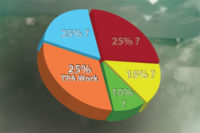Making Your Software Work For You

It continues to amaze me every time I hear an owner complaining about software they purchased that did not work out for them, especially when they profess that they do not have a clue why it did not work.
Without the owner clearly understanding the software being used in the company, it usually fails to be implemented properly, and things start down a path of failure and eventual non-use. Software is extremely cheap when compared to the cost of “attempted implementation.” Let me relate a story to illustrate this point. A restoration company owner (let’s call him “Sam”) wanted to install software that would allow him “to see what was really going on in his company.” He wanted to know what was going on whether he was in the office or out, so he took some time to speak with several software vendors.
The vendors explained how their software solution would address his problems and solve his needs. As an owner, you need to be aware that software companies are a lot like restoration companies, in that they are in the habit of telling you what is best about their company. They are also very good at selling you on the belief that their solution is the best solution for you.
Sam made the decision as to what software he was going to buy and then bought it. He did not involve any of his staff in the buying decision; critical mistake. He bought the software that he believed would do what both he and the company needed done. As we know, owners are usually very busy and never seem to have enough time to get everything done that they need done. As we also know, when you are not involved in the decision process of what is going to affect your work efforts, most people are at least mildly annoyed and feel they would like to have been involved in the process. Employees are just like owners in that they do not like change, they want to be trusted to do their job, and they do not want give up any control regarding anything concerning their job. A lot of owners have the mindset that, while they themselves do not like change, their employees are just waiting outside of the owners office, eagerly awaiting to be assigned a task that is going change their work environment!
One person who usually hates change more than the average employee is the company bookkeeper. In my experience, bookkeepers need boundaries, an area with no interruptions and, most of all, rules. And when they are confronted with change, they do not like it.
Well, guess who Sam picked to integrate the new software into the company culture? When I asked him why he had chosen the bookkeeper, he gave two reasons. The bookkeeper knew what he wanted done, he said, by virtue of her being his longest-serving employee. The second reason was that she had the most experience in that area, due to her daily use of the company’s accounting software.
I would like to suggest that longevity and working with a computer is a far cry from understanding how to teach and integrate new software for an entire company.
Sam admitted he did not understand the software, but said he believed that his bookkeeper would understand it, install it and show him how it worked, and the company would be all the better for it.
A couple of things happened that Sam was unwilling to deal with. He had the right vision, but he didn’t understand the software and its capabilities before he handed it off to his bookkeeper. The bookkeeper had no participation in the software-purchasing decision, and was not particularly happy with being handed yet one more task in her already overworked position.

Fast-forward several months: the bookkeeper is telling Sam that the software does not work very well and that, in her opinion, it was not what the company needed. After a bit of checking, it became apparent that:
- The bookkeeper was far too busy with her other duties to be properly trained and versed in the software, and
- She was dragging her feet and, intentionally or not, she was effectively stopping the implementation of the new software.
- The owner will be able to evaluate the software first-hand
- The owner will know when someone else might be “blowing smoke” when it comes to the software’s capabilities
- The staff will understand that, like it or not, with the owner investing his own time and energy to learn the software, they will have to be properly trained to use it themselves, and will be expected to use it in their own operations.
I only mention this additional software, because it helps illustrate what happens when you discover what doors it can open. The right software platforms allow the effective expansion and operation of a company without the need to hire additional personnel to monitor functions and operations. Yes, there is a cost to the software, but it pales when compared to putting people on the payroll to achieve the same results. Software is not the perfect answer to all situations, but it is a good answer to a lot of business situations.
Wishing you much success with your business in these difficult times.
Looking for a reprint of this article?
From high-res PDFs to custom plaques, order your copy today!








